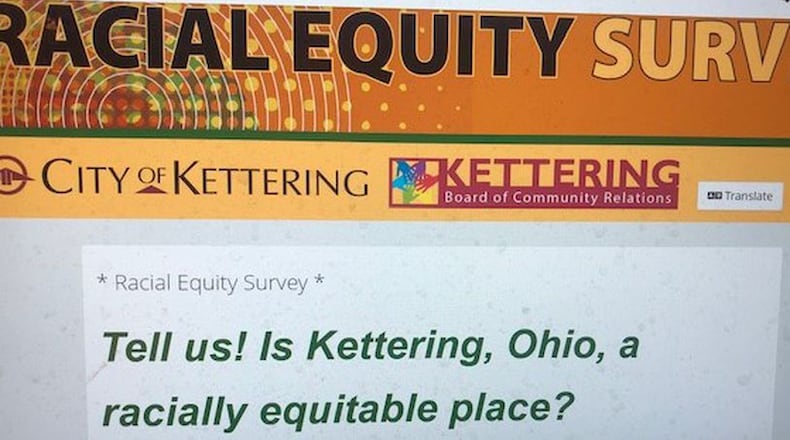The survey commissioned by the city’s Board of Community Relations has a 5% margin of error, records state.
According to the survey’s executive summary, “Residents of color were more likely than other respondents to disagree or strongly disagree that people in Kettering are treated equitably regardless of race, though they perceived less inequality in education and healthcare compared to other institutions.”
More than 70% of respondents overall agreed or strongly agreed that “white children and children of color” have the same opportunity for a good education in Kettering, results showed. Only 14% of respondents disagreed, while 15% were neutral.
Residents responding were more divided on whether Kettering police treat white residents and residents of color similarly. Those agreeing and disagreeing were both at 39%, with 22% being neutral, the data states.
That issue was among multiple topics — jobs, health care and interactions with city staff being others — in which more than 20% of residents responded with neutral answers, data shows.
“This uncertainty is not surprising given that interracial interactions are relatively infrequent,” states a survey assessment by social scientist Kristin Williams, a principal at NineteenEleven Consulting.
The results suggest Kettering “is not unlike most U.S. cities ... When it comes to perceptions about racism, there is little consensus,” Williams wrote.
The poll’s 56-page summary and assessment “really just is the beginning of conversations” for the city, said Tawana Jones, chair of the Board of Community Relations in Kettering, where the vast majority of residents are white.
“There will be lots more activities and projects and goals that will be done,” Jones added. “Some things are going to be easier than others. I think we’re going to have some tough conversations. We need to have honest and open dialogue and we need to make sure that we are listening more than we are talking.”
The city’s estimated 57,800 residents are 88.1% white, 4.2% Black and 2.8% involving two or more races, according to the U.S. Census Bureau. Asians make up 2.5% and Hispanics or Latinos 2.4%, census data shows.
The poll was intended to assess perceptions of racism, not necessarily to decide the existence or extent of racial inequity, officials said.
“The distinction between these two goals cannot be overstated because perceptions do not always align with the lived experiences of others,” Williams said in a statement issued by the city.
Williams outlined a handful of recommendations.
The vast majority of survey respondents (82%) said they are white, or members of their household are white. About 12 percent identified themselves and/or members of their household as being Black/African American, according to results.
The survey was taken online from Jan. 11 to March 24, 2021, after national protests following the May 2020 death of George Floyd, for which a Minneapolis police officer was convicted.
“A lot of the results could be related to the timing that we put it out,” Jones said. “But it could have been that we would have gotten those results 10 years ago.”
Kettering Police Chief Chip Protsman said in an email that “any time a police department can receive information on how it’s perceived by its citizens is valuable for us.”
A KPD survey also compiled in early 2021 showed respondents gave police a ranking of 4.5 on a 5 scale, the same as one in 2019. This included approval ratings of 96% in preventing crime, being polite when dealing with people and being friendly, similar marks as the previous survey, records show.
Protsman said his department’s top priority “is to continue to build strong relationships with the community. Information like this survey helps us meet that priority.”
Moving forward, Protsman said, his department “looks forward to working” with the CRB. The board will begin to map out a timeline to work with a variety of stakeholders, police, schools, businesses and churches among them, Jones said.
That will help ensure “that we are getting a mix of people who have a voice and who can help us move this forward,” she said.
RECOMMENDATIONS
An assessment of the Kettering’s Board of Community Relations’ survey results recommends city leaders and staff:
• Be transparent about survey results.
• Continue to gauge perceptions of racism among residents.
• Host community conversations where residents can engage in dialogue about race, racism and racial equity.
• Draft and publish a glossary of race-related terms.
• Adopt a racial equity framework to identify, track and address racial disparities in opportunities and outcomes.
About the Author

